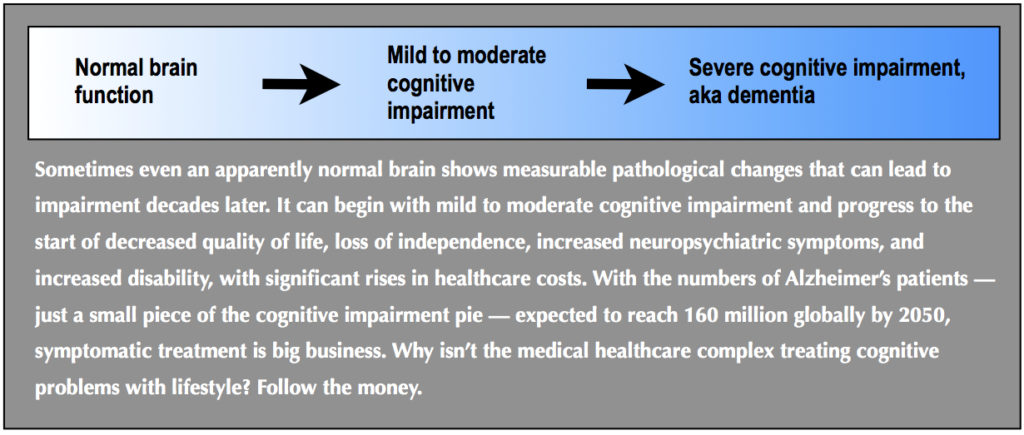
While many millions will develop Alzheimer’s and other similar brain disorders, it can be prevented and even reversed — something most health practitioners won’t tell you.
Alzheimer’s disease garners a lot of headlines but it’s only one of the many problems associated with a much larger issue — cognitive impairment.
Mild cognitive impairment is defined as a wide range of brain dysfunction, including seemingly harmless problems with memory, language, thinking and judgment. It’s often the beginning of declining brain function that can lead to a more serious form called dementia, a general condition that includes one specific type called Alzheimer’s.
Alzheimer’s is a common cause of death, and the healthcare costs of Alzheimer’s have now exceeded both cardiovascular disease and cancer. Furthermore, 65 percent of cases are among females, which means women are now more likely to get Alzheimer’s than breast cancer.
While Alzheimer’s disease gets most of the media attention and obscures the greater problem of cognitive impairment, it’s actually a relatively small segment of the total cognitive dysfunction burden. Alzheimer’s is only one of the neurological conditions that can cause cognitive impairment. Just like cardiovascular conditions, such as a stroke, can similarly damage the brain.
If a healthy brain loses function, we develop cognitive impairment. It’s vital to then find the cause and address it. Perhaps the most common conditions that can reduce cognitive function include blood-sugar dysfunction, carbohydrate intolerance (insulin resistance) and chronic inflammation. All three are interrelated, and usually appear along with excess body fat. The causes of these problems, which promote downstream cognitive impairment, are due to primary lifestyle imbalances. Therefore, focusing on these three conditions is key to prevention and treatment of cognitive dysfunction, including Alzheimer’s.
Cognitive impairment may affect up to about 30 percent of U.S. population in people over 70 years of age, and this figure may be similar in other Western countries. Studies show that about 14 percent of Americans have the genetic predisposition for Alzheimer’s alone, with a genetic test that measures the presence of various ApoE genotypes. While tests for other cognitive risks are not as simple, there is a lot you can do.
Despite spending billions of dollars looking for the magic pill, modern medicine has no successful treatment for Alzheimer’s or the many other cognitive impairments. But nature offers many answers.
Researchers already have evidence associating Alzheimer’s with other very similar chronic diseases. For example, risk factors for heart disease and stroke, such as high blood pressure, high cholesterol, and low levels of the vitamin folate may also increase the risk of Alzheimer’s disease. Type 2 diabetes corresponds to a chronic insulin resistance (i.e., carbohydrate intolerance). When it affects the brain, carbohydrate intolerance represents a major pathogenic mechanism of Alzheimer’s neurodegeneration, and has been called Type 3 diabetes.
Of course, clinicians aware of the therapeutic value of natural foods have been helping patients successfully prevent and treat brain impairment for decades using simple lifestyle measures. On this website you may read about many of them:
- Chronic inflammation.
- Carbohydrate intolerance.
- Free-radical stress.
- Mild dehydration and cognitive function.
- What is junk food?
In addition, a variety of over-the-counter and prescription drugs, such as those used for pain, insomnia and others, are a common cause of permanent and reversible cognitive impairment (talk with your health practitioner or pharmacist). They can cause confusion, delirium, and even mimic dementia, not to mention making driving an automobile dangerous. Even moderate alcohol can create these problems. Younger individuals who consume higher amounts of alcohol are at high risk for cognitive impairment later in life.
These conditions also can contribute to cognitive impairment, and can be successfully remedied through proper food choices:
- Too high or low blood pressure can negatively impact blood vessels in the brain and contribute to poor memory. Sometimes lowering blood pressure through medication can even mimic more serious cognitive problems because it can reduce blood flow to the brain.
- Depression is common in people with cognitive impairment. While depression itself can lead to forgetfulness and mental fog, it’s also a common symptom of carbohydrate intolerance. Other natural factors such as EPA from fish oil and natural folate have been successfully used to treat depression.
- Sleep apnea is a condition where your breathing repeatedly stops and starts while you’re asleep. Associated with carbohydrate intolerance, it makes it difficult to get a good night’s rest, leading to daytime fatigue, forgetfulness and poor concentration.
Three groups of nutrients can also help the brain directly.
- The micronutrients folate and vitamin D.
- Essential fats, including EPA from fish oil.
- The phytonutrients ginger, garlic, curcumin.
In addition, ketone bodies (produced from fats in the liver) can also be used by the brain for energy, especially during aging, when glucose may be less available.
Many of the conditions discussed here can be evaluated though user-managed health and fitness programs such as the MAF app.
Why wait for a genetic test or an assessment that shows you are high risk for Alzheimer’s or other cognitive impairment? It happens that eliminating junk food and eating only healthy food can result in a healthy brain, and reduce risk factors such as elevated blood pressure, triglycerides, cholesterol and glucose, including the conditions they create, cardiovascular disease and diabetes, all of which can contribute to cognitive impairment.
References
de la Monte SM, Wands JR. Alzheimer’s Disease Is Type 3 Diabetes–Evidence Reviewed. J Diabetes Sci Technol. 2008 Nov; 2(6): 1101–1113.
Bredesen DE. Reversal of cognitive decline: A novel therapeutic program. Aging (Albany NY). 2014 Sep; 6(9): 707–717.
Bredesen DE, Amos EC, Canick J, et al. Reversal of cognitive decline in Alzheimer’s disease. Aging (Albany NY). 2016 Jun; 8(6): 1250–1258.
Seshadri S, Drachman DA, Lippa CF. Apolipoprotein E epsilon 4 allele and the lifetime risk of Alzheimer’s disease. What physicians know, and what they should know. Arch Neurol. 1995;52:1074–79.









